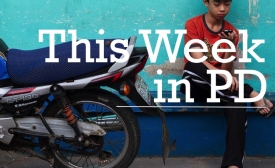digital diplomacy
The explosion in digital warfare tops the list of public diplomacy developments around the world in 2014, as identified by the University of Southern California’s Center for Public Diplomacy (CPD). Information operations by non-state and state actors alike have become a major factor in the 21st century.
So much for world peace in 2015. A selfie taken by a Miss Universe contestant, Doron Matalon, who represents Israel, has caused a huge stir – because one of the other contestants in the photo happens to be Saly Greige, Miss Lebanon.
A team of analysts at King’s College in London is building an exhaustive database of western Islamic State fighters – through Twitter and Facebook.
In 2014, China stepped up its campaign to shape international norms governing the Internet, moving vigorously in its public diplomacy and behind the scenes to subjugate the online world to state power.
Islamic State social media accounts are circulating disturbing and graphic images seemingly showing the executions of gay men, stoning of an alleged adulterer and other public executions. The barbaric acts of violence seem to have occurred in Iraq’s Nineveh province and Mosul.
Longtime CNN anchor Jim Clancy has left the cable news network following a controversial exchange on Twitter over the Charlie Hebdo attack in which he both mocked pro-Israel advocates and used a disability slur.
On Friday, a number of jihadist-linked Twitter accounts began tweeting links to khilafalive.info, a Web site which claims to be an "official website for the supporters of the Islamic State Caliphate." A selection of video and radio channels were hosted on the site, some playing Islamic State propaganda videos and others jihadi nasheeds (a type of Islamic vocal music). Users were able to "chat" with fellow viewers.

This week in Public Diplomacy, the use of new media and technologies dominated the global dialogue.







